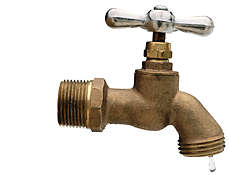|
|
|
|
|
|
|
|
|
|
|
 |
Water Conservation Tips |
|
|
|
|
|
|
|
The Plumbing Group, Inc.
123 Main Street
Anytown, NY 20317
USA
(212) 555-4321
(212) 555-1234 fax
Send Us
 E-mail
E-mail
© Copyright 2011
The Plumbing Group, Inc.
powered by Website2Go.com
All Rights Reserved
|

|


Water is our most precious resource. We must learn to protect and conserve our water supply, so we can continue to benefit from its many uses. Water sustains life. It provides us with recreational opportunities, electric power generation, and environmental beauty. We travel on it, get food from it, and, most importantly, drink it.
This area occasionally experiences periods of drought and residents are instructed to use as little water as possible. We can all take some simple steps in our everyday lives to prevent a future long-term water shortage - and save on our water bills in the process.
- Repair all plumbing leaks. To verify that your home is leak free, read your water meter before and after a two hour period when no water is being used. If the meter does not read exactly the same, there is a leak.
- Repair dripping faucets. If your faucet is dripping at a rate of one drip per second, you can waste 2,700 gallons per year!
- If the toilet hand frequently sticks in the flush position letting water run constantly, replace or adjust it.
- Never pour water down the drain when there may be another use for it such as watering a plant or garden, or for cleaning around your home.
- Don't use your toilet as a wastepaper basket.
- Turn your water faucets off while brushing your teeth, washing your face, and washing dishes.
- Use your automatic dishwasher and clotheswasher only with full loads.
- Sweep or blow off outdoor patios and driveways rather than using a hose to clean them.
- Choose water-efficient plumbing fixtures and appliances.
- Refrigerate a container of water for cold drinking water instead of allowing the faucet to run until the water is cold.
- Adjust your automatic sprinklers with the seasons. Shut sprinklers off when it is raining and after there has been a heavy rain.
- Water lawns early in the morning and avoid watering on windy days to prevent evaporation.
- Adjust sprinklers to insure you are not watering the house, sidewalk, or street.
- Buy a rain gauge to see how much rain or irrigation your lawn has received.
- Shut the water off when you're finished using it. This sounds like common sense, but a surprising number of people leave water running both in and outside of their houses.
|

|



